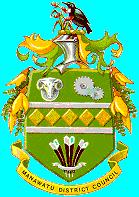Manawatu: Difference between revisions
Knorrepoes (talk | contribs) m (Text replace - "[[Literature" to "{{media}} [[Literature") |
Knorrepoes (talk | contribs) m (Text replacement - "|center]] ====Origin/meaning====" to "|center]] ====Official blazon==== ====Origin/meaning====") |
||
| Line 10: | Line 10: | ||
[[File:manawatu.nz.jpg|center]] | [[File:manawatu.nz.jpg|center]] | ||
====Official blazon==== | |||
====Origin/meaning==== | ====Origin/meaning==== | ||
Revision as of 16:35, 10 January 2016
| Heraldry of the World Civic heraldry of New Zealand |
MANAWATU
Region: Manawatu-Wanganui
Official blazon
Origin/meaning
The Manawatu District Council shield is coloured green signifying abundance. The two silver horizontal bars represent two rivers in the district: the Pohangina and Oroua.
Between these bars are five gold lozenges which represent the five wards within the district (Feilding, Kairanga, Kiwitea, Oroua, Pohangina) or the five former uniting authorities. The "lozenges in feese" have been used here because they are a direct link with both the Earls of Denbigh (Feilding family) and the Duke of Manchester and appear on the coats of arms of both.
The ram's head is symbolic of agriculture and the cogwheels of industry, while in the base of the crest the huia feathers (which are taken directly from the badge given to Feilding Agricultural High School by Sir Peter Buck in 1922) represent both education and the Maori people of the district to whom the huia feathers are a sign of chieftainship and high esteem.
The crest shows a "nutchat pecking at a hazel branch" and is the crest of the Earl of Denbigh. The tui and flax echo this while becoming a more national symbol.
Contact and Support
Partners:
Your logo here ?
Contact us
© since 1995, Heraldry of the World, Ralf Hartemink 
Index of the site
Literature : Information Manawatu City Council.











